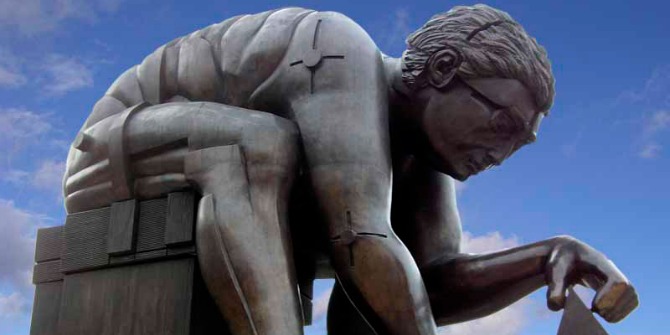 Where Wikipedia has poor-quality articles, we should regard it as a great opportunity, argues Martin Poulter. Researchers and educators, especially in social science, should get involved in improving the site both for its educational value and to promote their areas of study to a truly global audience.
Where Wikipedia has poor-quality articles, we should regard it as a great opportunity, argues Martin Poulter. Researchers and educators, especially in social science, should get involved in improving the site both for its educational value and to promote their areas of study to a truly global audience.
With more than four million articles in English, and text in 284 other languages, Wikipedia is the world’s fifth most popular web site. Reaching about half a billion readers per month, it is a medium through which quite obscure scientific concepts and findings can reach an enormous global audience. Many of the scientific articles are viewed hundreds or even thousands of times per day. Wikipedia is also the ultimate in open access: not only does it aim to make the sum of human knowledge available to the world for free, but all its content is freely licenced (either public domain or a suitable Creative Commons licence) for anyone to adapt and reuse.
I started writing for Wikipedia in earnest when, post-PhD, I decided I wanted to both expand my knowledge of cognitive psychology and share my interest with the public at large. By writing something that would be consulted by a lay audience – that had to be original and yet based on reliable published research – I forced myself into both good scholarly habits and accessible writing.
Although Wikipedia advertises that “anyone can edit”, in practice there are policies requiring contributors to cite reliable sources, write accessibly and keep a neutral, factual tone. Academics with a grasp of the literature and access to the best quality sources have an advantage here. Social science is one of the weaker areas of Wikipedia’s coverage – central concepts in some areas still lack their own articles.
What has kept me hooked is the huge readership for Wikipedia articles: those to which I’m a major contributor get thousands of hits every single day, and that is just in English. I’ve seen my text translated into languages including Russian and Indonesian, which I can only imagine ever happening via either a huge, bureaucratic, expensive project or via Wikipedia. Even the more obscure articles that get a dozen hits a day are often the top Google hit for their topic, and thus the first thing many people will consult to learn about it.
Wikipedia is intrinsically collaborative, and while many of us find it hard to relinquish control of something we’ve spent serious time on, the experience has taught me that I can make a better end product in collaboration than I ever can by working purely alone. The other users’ changes included many improvements to wording or consistency, much like the copyediting in professional publication.
Even when my work has been criticised by people with no knowledge of the subject matter, it turned out to be useful because Wikipedia is intended for the broadest possible audience. If the point of an article does not come across to a newcomer, maybe I need to improve the article rather than boasting about my superior qualifications. Unlike YouTube, Twitter and many other online communities, Wikipedia is moderated. Personal attacks are not tolerated and discussion aims at improving the articles, not general chatter.
I don’t want my words to be set in stone for all time: I hope and expect that other users will update the articles as new research comes out. I do want some longevity for what I write, but the best way to do that is to do the best work possible, based on the best quality academic sources. While blatant vandalism is dealt with very quickly, truly encyclopedic text is much less likely to change.
To pass Wikipedia’s review processes and be accepted as a Good Article, Featured Article or front-page article, a Wikipedia article needs not just to be comprehensive and well-written but illustrated. So you can contribute without writing any text, by uploading graphs, photographs or other media.
An article that I overhauled, on Confirmation bias, went through three different review processes and eventually became a front page article; its one-paragraph summary seen by more than five million people in a single day. Tracking links in popular blogs and online communities, I could see discussion of confirmation bias spread across the web, and the particular form of words I chose in my definition has cropped up in many different forums, even an editorial in a prominent academic journal. This was actually shaping public debate, influencing how people talk about a given topic.
If you have students, a more efficient way to improve Wikipedia is to ask them to write articles as part of a university assignment, then assess their contributions. In September 2012, the University of Leicester hosted the first EduWiki Conference, bringing together academics, support staff and Wikipedia contributors. We learnt that, after a pilot project in the US, Wikipedia assignments are already being used in dozens of universities in several countries. They work best with final-year undergraduate or beginning-postgraduate students. These assignments can really motivate because they give a real experience of publication, unlike a dissertation that may only be read by a few people.
This is how I see the educational potential of Wikipedia and similar free projects: not a static resource for students to consume, but an online community for researchers, educators and students to take part in.
Note: This article gives the views of the author, and not the position of the Impact of Social Sciences blog, nor of the London School of Economics.
Wikimedia UK, the national charity which supports Wikipedia and its sister projects, has detailed advice on its web site for scientists who want to contribute.
About the author:
Dr Martin Poulter obtained his PhD in Philosophy of Science at the University of Bristol. He has two day jobs at the University of Bristol, in teaching support and in new media for a health research project. He is also a volunteer Associate of the charity Wikimedia UK, focusing on relations between Wikimedia and academia.








This is hopeful Wikipedia promotion. My experience says otherwise. I cannot tell you the number of times, back when I used to do this, that I cleaned up the grammar or wording of text that had what to me (as a University teacher of writing) were obvious errors or at least infelicities, only to have these changes deleted and replaced with new text just as bad as the old was–because most of the young male Wikipedia editors are not good writers and don’t see the value of what “better” writers like you and I might contribute. Watching well-written text quickly dissolve into much less good writing becomes really tiresome. But keep telling us how great Wikipedia is for having put every other encyclopedia in the world out of business and now hitting us up for money constantly.